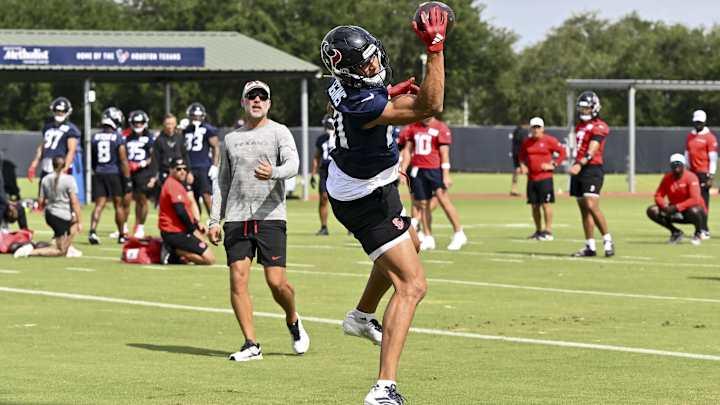Houston TexansŌĆÖ Contract Stalemate Triggers Unusual Delay in NFL Second-Round Rookie Signings
Unraveling the TexansŌĆÖ Contract Negotiation Standstill
This NFL draft season has witnessed an extraordinary disruption as the Houston Texans find themselves embroiled in a protracted contract negotiation with one of their key second-round draft picks. Unlike the typical swift agreements that follow the draft, this deadlock has extended well beyond the usual timeframe, marking a rare occurrence in league history. The dispute centers on disagreements over contract specifics, including signing bonuses and guaranteed incentives, which have not only stalled HoustonŌĆÖs progress but also cast a shadow over other teamsŌĆÖ second-round signings.
Ordinarily, NFL franchises aim to finalize rookie contracts within one to two weeks post-draft to ensure roster stability and effective salary cap management. However, the TexansŌĆÖ ongoing impasseŌĆönow stretching past 18 daysŌĆöhas unsettled this norm, prompting league-wide caution and hesitation among other teams in concluding their own deals.
- Signing bonus disparities: The TexansŌĆÖ offer diverges significantly from the standard slot values, sparking contention.
- Complex guarantees and incentives: Proposed contract clauses introduce atypical conditions, complicating negotiations.
- Setting new precedents: The outcome could redefine negotiation tactics for mid-round draft picks across the NFL.
| Team | Typical Signing Timeline | Current Status |
|---|---|---|
| Houston Texans | Within 10 days | Ongoing delay (Day 18+) |
| Other NFL Teams | 7 to 12 days | Experiencing knock-on delays |
Consequences for Team Cohesion and Draft Management
The TexansŌĆÖ contract deadlock has reverberated beyond front-office discussions, influencing locker room dynamics and preseason preparations. The delay in signing a pivotal rookie disrupts the integration process, leaving coaches and players uncertain about the newcomerŌĆÖs role and availability. Veteran players have voiced concerns that this discord could fracture team unity, a critical factor as Houston embarks on a rebuilding phase.
Strategically, the Texans are compelled to rethink their draft development plans amid this uncertainty. The holdout affects resource allocation, forcing coaching staff to divert attention from skill enhancement to managing distractions. Key strategic shifts include:
- Postponed rookie assimilation: Contract delays slow the playerŌĆÖs involvement in team activities.
- Contingency planning: Preparing for scenarios where the holdout extends into the regular season.
- Coaching focus dilution: Additional time spent on managing off-field issues rather than on-field development.
| Aspect | Initial Plan | Current Adjustment |
|---|---|---|
| Training Camp Participation | Full attendance expected | Delayed or uncertain start |
| Offensive Scheme Integration | Early involvement in game plans | Postponed role definition |
| Team Chemistry | Gradual development | Risk of internal divisions |
Financial Ramifications and Emerging NFL Contract Trends
Experts analyzing the TexansŌĆÖ stalled negotiations suggest this incident could signal a broader shift in how NFL teams approach rookie contracts, especially for mid-round selections. The TexansŌĆÖ firm stance on contract terms may encourage franchises to adopt more cautious financial strategies, potentially reshaping rookie deal structures across the league.
Key financial impacts include:
- Increased salary cap flexibility: Teams might avoid front-loading contracts, preserving cap space for future needs.
- Extended contract durations: Longer rookie deals with reduced guaranteed sums could become standard.
- Altered player bargaining power: Second-round picks may need to adjust expectations regarding initial compensation.
| Contract Element | Pre-Texans Situation | Projected Post-Texans Shift |
|---|---|---|
| Average Contract Length | 4 years | 5+ years |
| Guaranteed Money Percentage | ~60% | 45-50% |
| Average Signing Bonus | $2.5 million | Approximately $1.8 million |
| Cap Hit Distribution | Front-loaded | More evenly spread |
Strategies to Overcome Contract Deadlocks and Streamline Future Negotiations
Resolving the TexansŌĆÖ current contract impasse requires a collaborative approach emphasizing openness and timely communication. Both parties could benefit from establishing firm negotiation deadlines and involving impartial mediators to facilitate smoother discussions. Additionally, adopting analytics-driven contract frameworks that balance market trends with player performance data may help close valuation gaps more effectively.
Looking ahead, the Texans might consider implementing a comprehensive negotiation protocol to prevent similar delays in future drafts. Recommended measures include:
- Proactive player engagement: Initiating early conversations to align expectations before the draft.
- Use of standardized contract templates: Tailored agreements for different draft tiers to simplify negotiations.
- Continuous review of negotiation tactics: Learning from past cycles to refine approaches.
| Recommendation | Expected Benefit |
|---|---|
| Third-party mediation | Accelerated dispute resolution |
| Early player engagement | Better alignment on contract expectations |
| Data-driven valuation models | More equitable and transparent offers |
| Standardized contract templates | Streamlined and efficient negotiations |
Looking Ahead: The Broader Impact on the NFL Landscape
The ongoing contract stalemate involving the Houston Texans has sent shockwaves through the NFL, disrupting the usual cadence of second-round rookie signings and highlighting the intricate challenges of modern player-team negotiations. This situation underscores how a single franchiseŌĆÖs approach can influence league-wide practices, potentially reshaping contract norms and negotiation strategies for years to come. As the Texans work toward a resolution, teams and fans alike remain watchful, aware that in the high-stakes environment of professional football, every contract negotiation carries implications far beyond the individual player.

